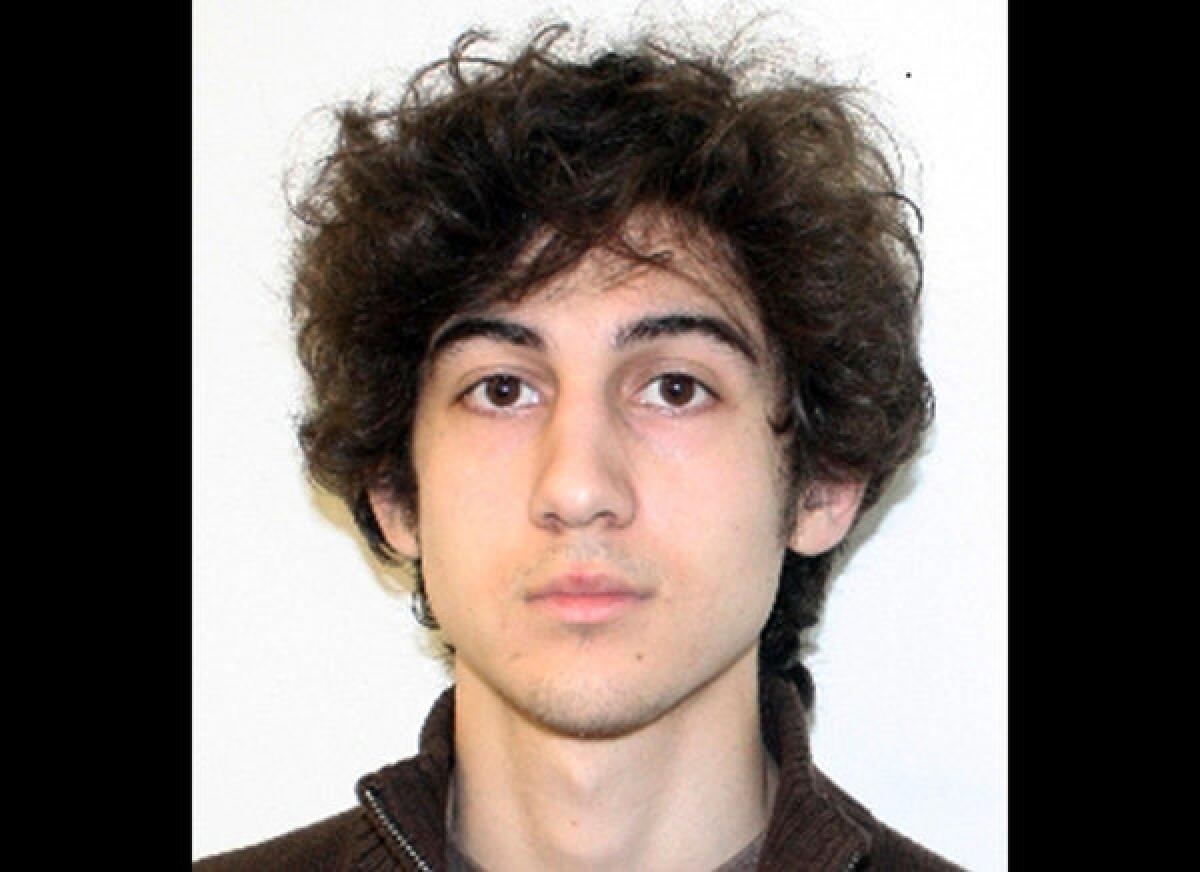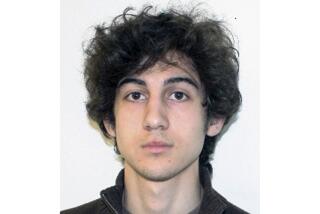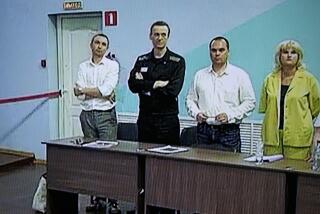Legal battle flares over Dzhokhar Tsarnaev security measures

- Share via
Civil rights groups are now weighing in on security measures placed on Boston Marathon bombing suspect Dzhokhar Tsarnaev and his lawyers, arguing that they are too restrictive and may be preventing the defense from adequately preparing for what may be a death penalty case.
The American Civil Liberties Union of Massachusetts attempted to file a “friend of the court” brief in U.S. District Court in Boston on Tuesday to address the security measures, but Judge George O’Toole denied the motion the next day.
Tsarnaev was captured and arrested April 19, shortly after his brother, Tamerlan, was killed in a police shootout and four days after the bombings near the Boston Marathon finish line killed three people and injured more than 260.
PHOTOS: Manhunt for bombing suspects
At issue now are the Special Administrative Measures, or SAMs, put in place by U.S. Atty. Gen. Eric H. Holder Jr. on Aug. 27. SAMs are usually used in terrorism cases in which authorities believe that the defendant could cause bodily injury to others through his contact with others.
The measures order that Tsarnaev be held in solitary confinement, and that his visits and calls are subject to monitoring. The measures also restrict Tsarnaev’s attorneys from disclosing information about the trial to others, unless those people are specifically preparing his defense.
Both sides have been battling since last month, when Tsarnaev’s attorneys filed a brief arguing that the measures were “unlawful and unwarranted” and violated his 1st, 5th and 6th Amendment rights. Defense attorneys said that Tsarnaev “has done nothing since his arrest to abet or encourage” others to violence and said the measures “gravely impair the ability of counsel to provide effective assistance to Mr. Tsarnaev.”
Government prosecutors submitted briefs in which they argued that writings found in the Watertown, Mass., boat where Tsarnaev took refuge show “an avowed wish to incite others to engage in violent jihad.” They cite a July 2013 issue of Al Qaeda’s Inspire magazine, which lauds Tsarnaev, as proof that the defendant could still cause harm to others.
The ACLU, in its brief, focused on how the measures affected Tsarnaev’s attorneys.
Attorneys are given vague instructions on exactly what composes “preparing for defense,” making them worry that they will violate the measures by mistake and risk losing their legal license, said Matthew Segal, an attorney with the ACLU of Massachusetts. The measures also mean that prison officials can see any document that attorneys bring with them to prison. All in all, they represent too many hoops to jump through, he said.
“Taking up attorney time with these measures violates the 6th Amendment unless it’s done for a really good reason,” Segal said in an interview. “Every moment the attorney spends trying to comply with the measures is one she is not spending helping her client.”
This is not the first time that the ACLU has raised objections over how the Tsarnaev trial and investigations have been handled. After a friend of Tamerlan Tsarnaev was shot and killed by the FBI during an investigation in May, the ACLUs of Massachusetts and Florida each wrote a letter to their respective state attorney general requesting that the shooting be investigated.
Meanwhile, Dzhokhar Tsarnaev’s attorneys continue to argue that they are being hamstrung as they attempt to prepare for trial.
In a filing on Thursday, defense lawyers argued that “the government continues to withhold reports and testimony of the greatest utility and interest concerning those closest to Tsarnaev.” The filing also reminded prosecutors that the execution of Oklahoma bomber Timothy McVeigh was delayed when it came to light that the FBI had failed to turn over 3,000 pages of interview reports.
The defense is also asking for many documents, including those concerning whether Tsarnaev asked for a lawyer during questioning at a hospital; any surveillance of Tsarnaev family members; and all documents about a triple homicide on Sept. 11, 2011, concerning the possible involvement of one of the Tsarnaev brothers.
ALSO:
Colorado officials consider new rules on growing hemp
Detroit barbershop shooting called ‘urban terrorism’; 3 dead
Whitey Bulger has no redeeming value, prosecutors tell judge
Twitter: @AlanaSemuels
Follow L.A. Times National on Twitter
More to Read
Sign up for Essential California
The most important California stories and recommendations in your inbox every morning.
You may occasionally receive promotional content from the Los Angeles Times.














